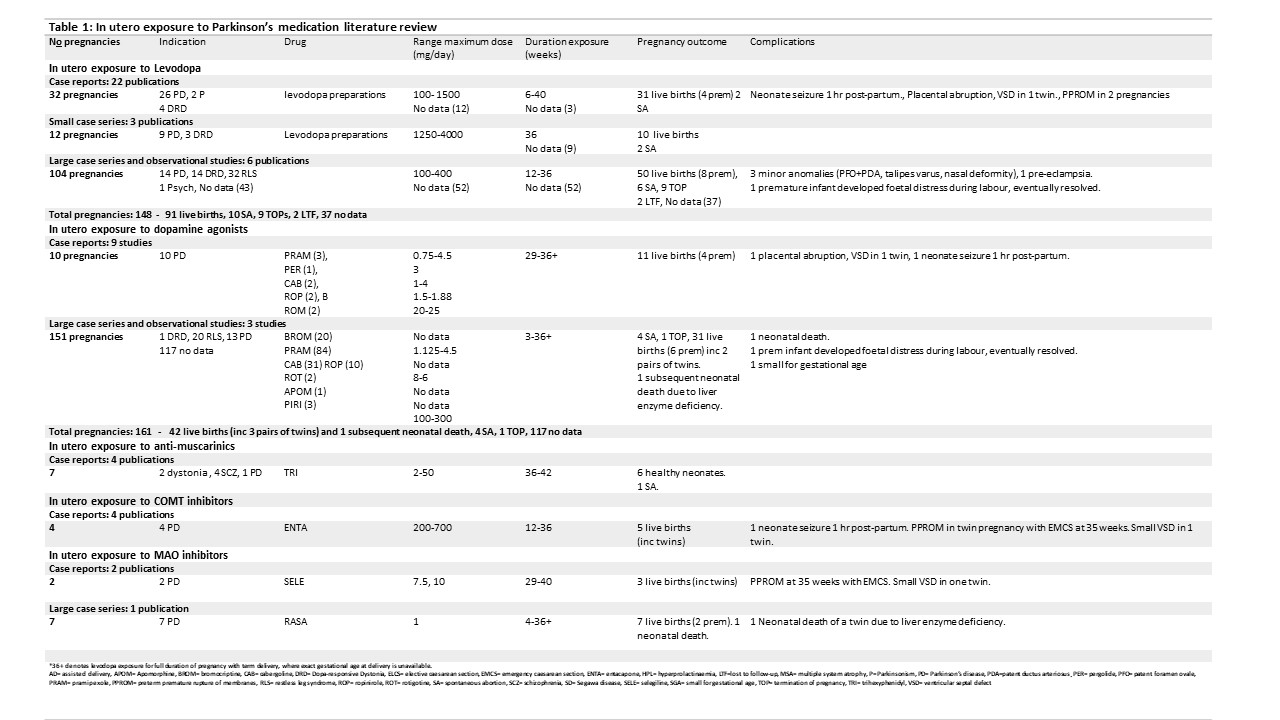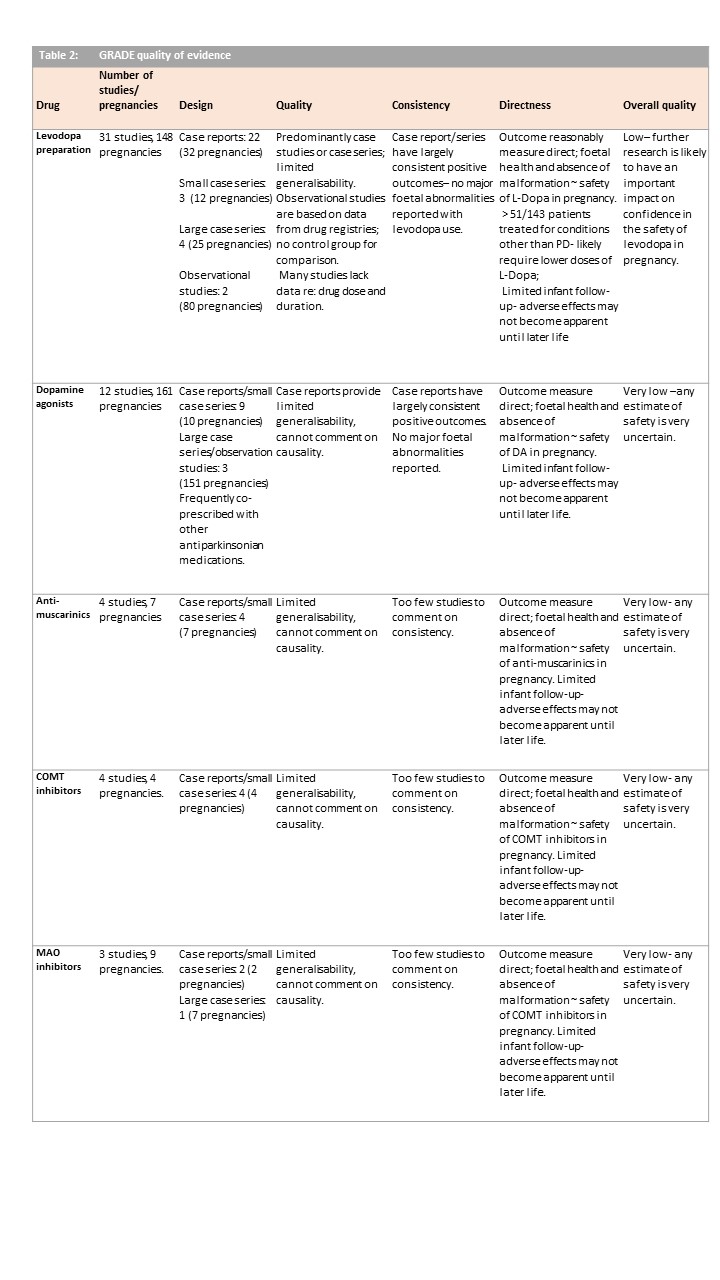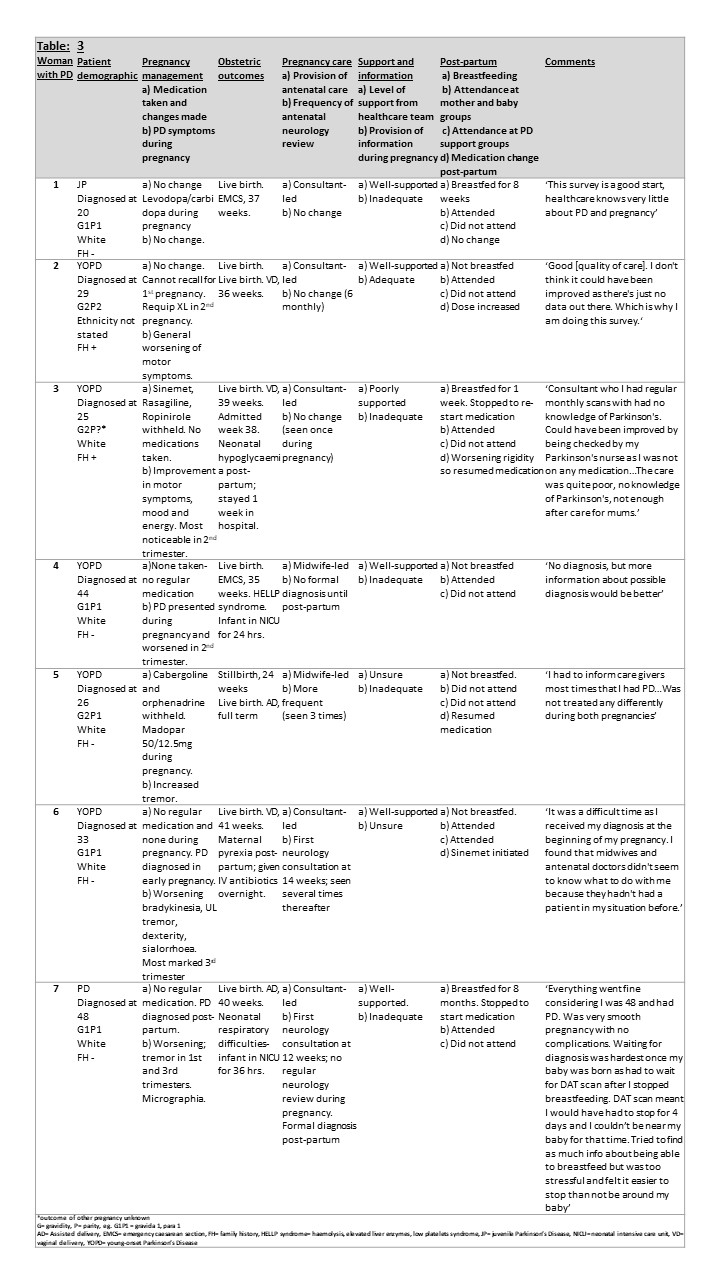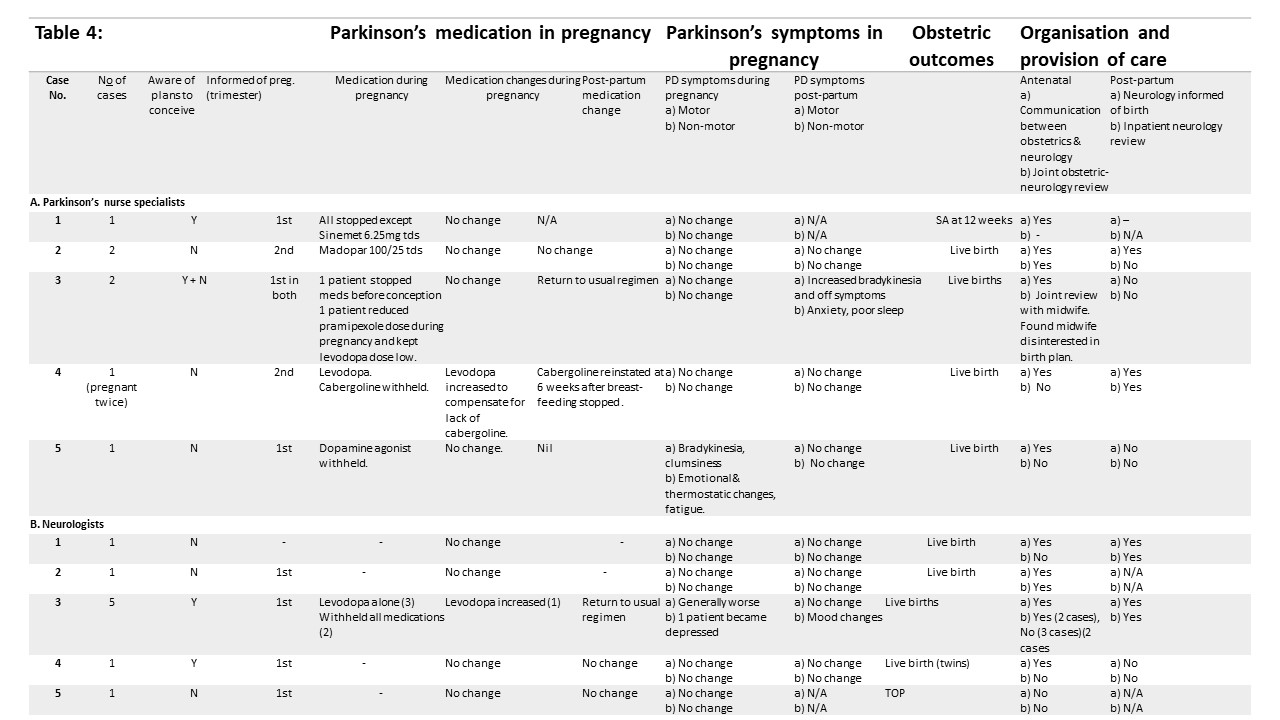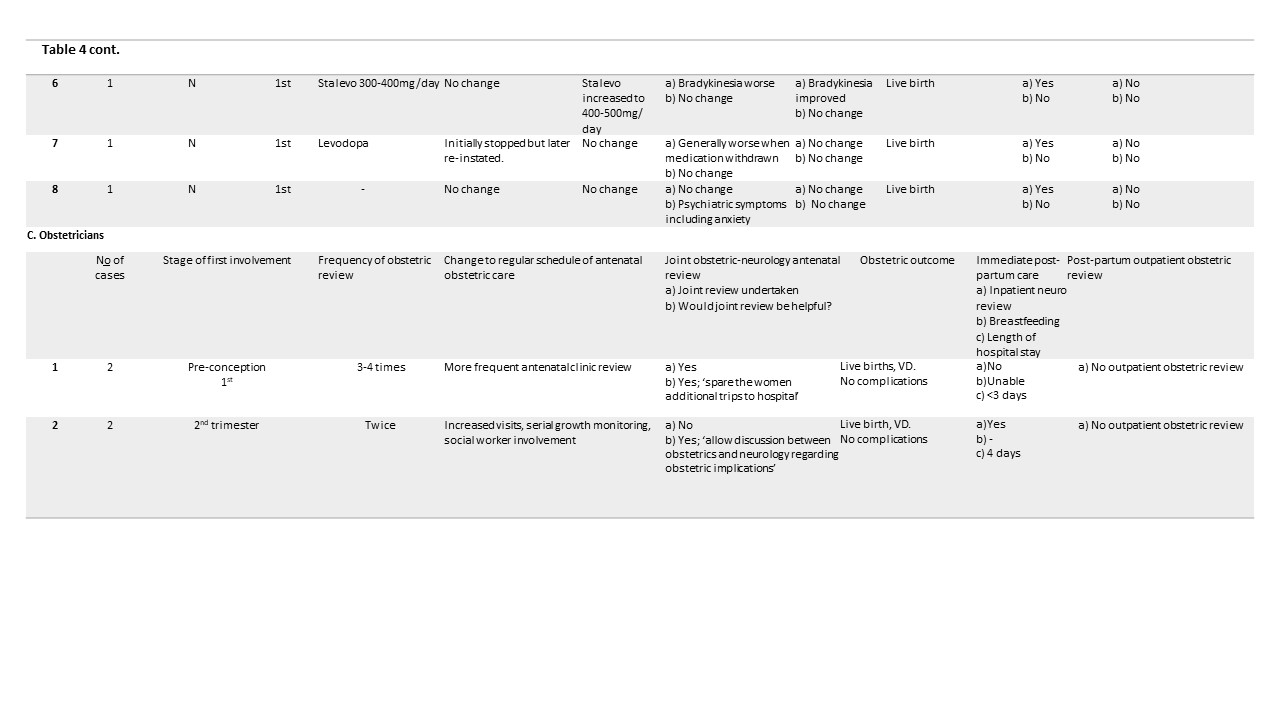Session Information
Date: Tuesday, September 24, 2019
Session Title: Parkinsonisms and Parkinson-Plus
Session Time: 1:45pm-3:15pm
Location: Agora 3 West, Level 3
Objective: To examine the management of Parkinson’s Disease (PD) during pregnancy through i) literature review and ii) patient and multi-disciplinary team (MDT) survey.
Background: The incidence of pregnancy in women with PD is unclear, although this may rise given the trend towards increasing maternal age.[1] Previous case series document outcomes in multiple pregnancies, including adverse events such as spontaneous abortion.[2,3] Information about the use of PD medication during pregnancy is largely anecdotal and lacks long-term follow-up. Lack of evidence-based practice and standardised clinical guidelines means clinicians and patients face uncertainty as to how best care may be achieved.
Method: Results of our literature review were evaluated in accordance with the GRADE quality criteria, and information collected via online survey from: women with PD who had been pregnant since diagnosis, neurologists, obstetricians, midwives and PD specialist nurses. Five key domains were examined: use of PD medication and symptoms during pregnancy, organisation and provision of clinical care, adverse obstetric events and delivery, and the post-partum period, breastfeeding and support. Healthcare professionals without experience in this setting were invited to share suggested management plans.
Results: Literature review identified the predominance of evidence for the use of levodopa and dopamine agonists during pregnancy, totalling 309 pregnancies and 14 adverse events (e.g. placental abruption. [2-39] A total of 127 completed online surveys were received; patients (n=7, 10 pregnancies), neurologists (n=35), PD Nurse Specialists (n=50), obstetricians (n=15), midwives (n=20). Overall, this study identified 20 further pregnancies in women with PD, with medication continued in nine, and only a single reported complication (stillbirth at 24 weeks) in the context of levodopa treatment. Consensus MDT opinion was of early, active communication between Neurology and Obstetric teams, and increased frequency of clinical review during gestation.
Conclusion: This study is the first to report clinical outcomes of PD during pregnancy from both patients’ and clinicians’ perspectives and to gather wider multi-disciplinary opinion on the optimum approach to care.
References: 1. Laopaiboon M, Lumbiganon P, Intarut N, Mori R, Ganchimeg T, Vogel JP, et al. Advanced maternal age and pregnancy outcomes: a multicountry assessment. BJOG: An International Journal of Obstetrics & Gynaecology. 2014;121(s1):49-56. 2. Tüfekçioğlu Z, Hanağası H, Yalçın Çakmaklı G, Elibol B, Esmeli Tokuçoğlu F, Kaya ZE, et al. Use of anti-Parkinson medication during pregnancy: a case series. Journal of Neurology. 2018;265(8):1922-9. 3. Golbe LI. Parkinson’s disease and pregnancy. Neurology. 1987;37(7):1245-9. 4. Allain H, Bentue-Ferrer D, Milon D, Moran P, Jacquemard F, Defawe G. Pregnancy and Parkinsonism: A Case Report Without Problem. Clinical Neuropharmacology. 1989;12(3):217-9. 5. Asha B, Hansali N, Apoorva P. Successful birth of an IVF baby in a patient with Parkinson’s disease. Journal of Human Reproductive Sciences. 2010;3(1):42-3. 6. Ball MC, Sagar HJ. Levodopa in pregnancy. Mov Disord. 1995;10(1):115. 7. Basile S, Pinelli S, Garibaldi S, Altamura C, Calcagno M, Salerno MG. Cathecol-O-methyltransferase inhibitors: another possibly useful pharmacological tool for treating Parkinson’s disease in pregnancy? J Obstet Gynaecol. 2017;37(3):381-2. 8. Campos-Sousa RN, Almeida KJ, Dos Santos AR, Lopes-Costa PV, da Silva BB. Multiparity after an initial diagnosis of Parkinson’s disease: a report on a rare case. Fertil Steril. 2008;90(5):2005.e1-2. 9. Cook DG, Klawans HL. Levodopa during pregnancy. Clin Neuropharmacol. 1985;8(1):93-5. 10. De Mari M, Zenzola A, Lamberti P. Antiparkinsonian treatment in pregnancy. Mov Disord. 17. United States2002. p. 428-9. 11. Dostal M, Weber-Schoendorfer C, Sobesky J, Schaefer C. Pregnancy outcome following use of levodopa, pramipexole, ropinirole, and rotigotine for restless legs syndrome during pregnancy: a case series. Eur J Neurol. 2013;20(9):1241-6. 12. Ha DE, Legendre G, Colau JC. Maladie de Parkinson juvénile et prématurité récidivante. À propos d’un cas. Gynécologie Obstétrique & Fertilité. 2007;35(3):224-7. 13. Hagell P, Odin P, Vinge E. Pregnancy in Parkinson’s disease: a review of the literature and a case report. Mov Disord. 1998;13(1):34-8. 14. Jacquemard F, Palaric JC, Allain H, Giraud JR. [Parkinson disease and pregnancy. Apropos of a case]. J Gynecol Obstet Biol Reprod (Paris). 1990;19(4):461-3. 15. Kallen B, Borg N, Reis M. The use of central nervous system active drugs during pregnancy. Pharmaceuticals (Basel). 2013;6(10):1221-86. 16. Kanzato N, Nishihira T, Murao H, Takara H. [Case of juvenile parkinsonism in pregnancy]. Rinsho Shinkeigaku. 2006;46(6):400-3. 17. Kupsch A, Oertel WH. Selegiline, pregnancy, and Parkinson’s disease. Mov Disord. 1998;13(1):175-6. 18. Lindh J. Short episode of seizures in a newborn of a mother treated with levodopa/carbidopa/entacapone and bromocriptine. Mov Disord. 2007;22(10):1515. 19. Nomoto M, Kaseda S, Iwata S, Osame M, Fukuda T. Levodopa in pregnancy. Mov Disord. 1997;12(2):261. 20. Nygaard TG, Marsden CD, Fahn S. Dopa-responsive dystonia: long-term treatment response and prognosis. Neurology. 1991;41(2 ( Pt 1)):174-81. 21. Routiot T, Lurel S, Denis E, Barbarino-Monnier P. [Parkinson’s disease and pregnancy: case report and literature review]. J Gynecol Obstet Biol Reprod (Paris). 2000;29(5):454-7. 22. Scott M, Chowdhury M. Pregnancy in Parkinson’s disease: unique case report and review of the literature. Mov Disord. 2005;20(8):1078-9. 23. Scelzo E, Mehrkens JH, Bötzel K, Krack P, Mendes A, Chabardès S, et al. Deep Brain Stimulation during Pregnancy and Delivery: Experience from a Series of “DBS Babies”. Frontiers in Neurology. 2015;6:191. 24. Serikawa T, Shimohata T, Akashi M, Yokoseki A, Tsuchiya M, Hasegawa A, et al. Successful twin pregnancy in a patient with parkin-associated autosomal recessive juvenile parkinsonism. BMC Neurol. 2011;11:72. 25. Shulman LM, Minagar A, Weiner WJ. The effect of pregnancy in Parkinson’s disease. Mov Disord. 2000;15(1):132-5. 26. Thulin PC, Woodward WR, Carter JH, Nutt JG. Levodopa in human breast milk Clinical implications. Neurology. 1998;50(6):1920. 27. von Graevenitz KS, Shulman LM, Revell SP. Levodopa in pregnancy. Mov Disord. 1996;11(1):115-6. 28. Ward VD. Anaesthesia for Caesarean section in a patient with Parkinson’s disease. Int J Obstet Anesth. 2018;34:99-102. 29. Watanabe T, Matsubara S, Baba Y, Tanaka H, Suzuki T, Suzuki M. Successful management of pregnancy in a patient with Segawa disease: case report and literature review. The journal of obstetrics and gynaecology research. 2009;35(3):562-4. 30. Watanabe T, Matsubara S. Good obstetric outcome in a patient with Segawa disease. Arq Neuropsiquiatr. 2012;70(7):559-60. 31. Zhu L, Cairns NJ, Tabbal SD, Racette BA. Pregnancy in multiple system atrophy: a case report. Journal of Medical Case Reports. 2011;5:599-. 32. Zlotnik Y, Giladi N, Hilel A, Shapira Y, Goldstein S, Gurevich T. Levodopa-carbidopa intestinal gel (LCIG) infusion during pregnancy and delivery: first documented case. Parkinsonism Relat Disord. 2014;20(11):1317-8. 33. Benbir G, Ertan S, Ozekmekci S. Successful pregnancy and delivery in a patient with Parkinson’s disease under pramipexole treatment. La Presse Médicale. 2014;43(1):83-5. 34. Benito‐León J, Bermejo F, Porta‐Etessam J. Pregnancy in Parkinson’s disease: A review of the literature and a case report. Movement Disorders. 2001;14(1):194-. 35. Lamichhane D, Narayanan NS, Gonzalez-Alegre P. Two cases of pregnancy in Parkinson’s disease. Parkinsonism & related disorders. 2014;20(2):239-40. 36. Mucchiut M. Pramipexole-treated Parkinson’s disease during pregnancy. Mov Disord. 2004;19:1114-5. 37. Goyal SK, Goel A. Successful Use of Risperidone, Trihexyphenidyl, and Paroxetine in Pregnancy. Indian journal of psychological medicine. 2017;39(6):835-6. 38. Mendhekar DN, Andrade C. Uneventful use of haloperidol and trihehexyphenidyl during three consecutive pregnancies. Archives of Women’s Mental Health. 2011;14(1):83-4. 39. Robottom BJ, Reich SG. Exposure to high dosage trihexyphenidyl during pregnancy for treatment of generalized dystonia: case report and literature review. Neurologist. 2011;17(6):340-1.
To cite this abstract in AMA style:
C. Young, R. Phillips, L. Ebenezer, R. Zutt, C. Mitchell, K. Peall. The management of Parkinson’s Disease during pregnancy: literature review, case series and multi-disciplinary input [abstract]. Mov Disord. 2019; 34 (suppl 2). https://www.mdsabstracts.org/abstract/the-management-of-parkinsons-disease-during-pregnancy-literature-review-case-series-and-multi-disciplinary-input/. Accessed April 26, 2025.« Back to 2019 International Congress
MDS Abstracts - https://www.mdsabstracts.org/abstract/the-management-of-parkinsons-disease-during-pregnancy-literature-review-case-series-and-multi-disciplinary-input/

